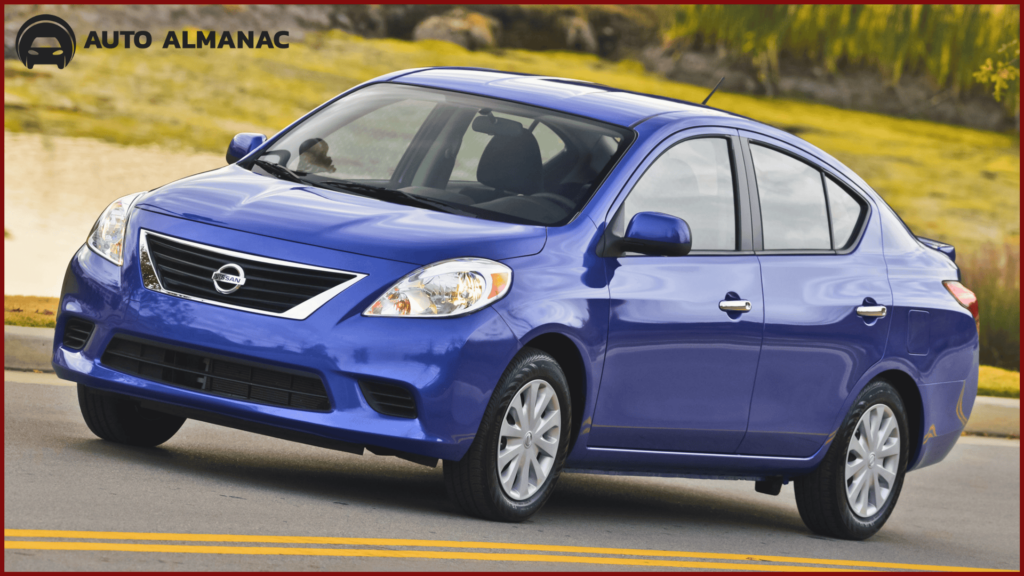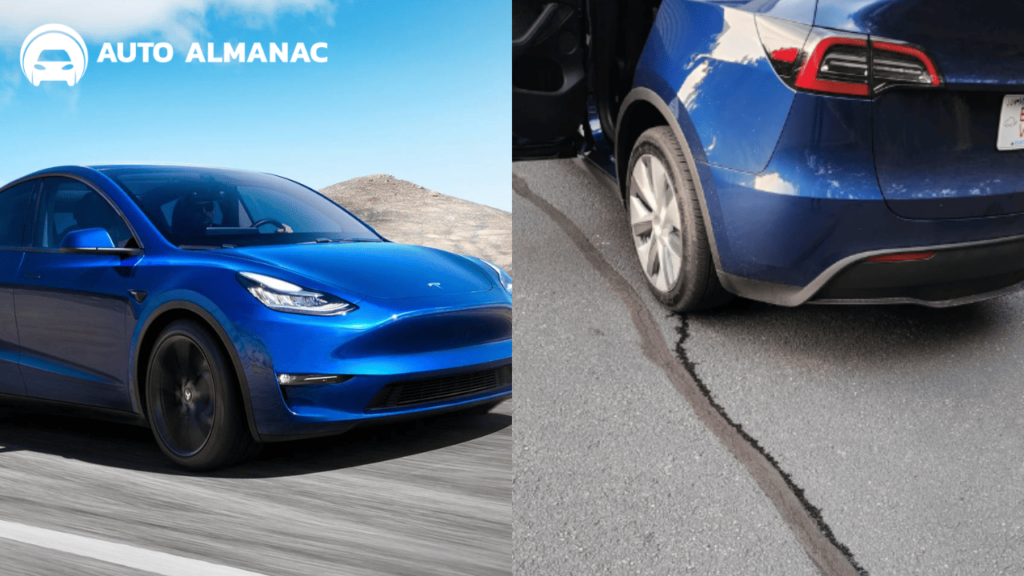We’re partly convinced that the Nissan Versa is cut from the same cloth as an Altima driver, except it’s not exactly the one behind the wheel, but it’s inherently the car itself.
With all the sudden lane-swerving and bucking about in this thing as well as the horn-blasting from other drivers thinking you fell asleep at the lights, it can feel like it has a complete disregard for you and anyone within a one-mile radius (again, like an Altima driver).
These things obviously don’t happen 24/7 for every unit released (otherwise, stop reading and pick another car), but if you do give the Versa a chance, just know that your almighty zip ties aren’t always going to work on all the problems it has on this list!
Oh boy, we’ve tried!
What are the common problems of a Nissan Versa?
Common problems of the Nissan Versa include engine stalling, CVT/transmission issues and failure, bad suspension coil springs, steering problems, faulty airbags, EVAP issues, windshield wiper issues, and exhaust system corrosion.
Cars rolling out of Nissan’s factory don’t exactly have the cleanest track record for reliability, at least not by Japanese automotive standards, and the little Versa compact-turned-subcompact car is no different.
Earlier model years of the Nissan Versa leave much to be desired in the integrity of their exhaust systems that rotted until they fell off, airbags that did the opposite of protecting occupants, and coil springs that gave you a nasty tire blowout.
Even slightly newer ones from 2012 onwards came with CVTs that would make the entire car violently jerk as if you’ve been rear-ended, which is only an eighth of the symptoms their problematic powertrains can throw at you.
There are several more where that came from all around the car, so if you want to own a Nissan Versa yourself, we suggest looking out for all the common issues as well as their possible fixes we listed below!
1. Sudden Engine Stalling

A relatively common problem with the Nissan Versa is its engine suddenly stalling or shutting off in the middle of a drive, raising a significant safety concern, especially when going at higher speeds or with traffic around.
This engine stalling issue has been mostly observed in the 2012 model, though it’s also known to occur fairly frequently in other 2nd-generation “N17” Versa models up until 2015.
There can be several culprits as to why this happens, including problems with any component involved in the engine combustion process (think air, fuel, and spark). Malfunctioning sensors may be a potential reason as well.
| Nissan Versa Common Engine Stalling Reasons: Bad fuel pump Faulty fuel pressure sensor Clogged/dirty throttle bodyFaulty MAF sensor Faulty oxygen sensorBad alternator |
Another possible cause is an issue with the ECM (engine control module) itself, which can affect the performance of all the components (and many more) mentioned above.
Regardless, it’s important to have your vehicle properly diagnosed and scanned for any stored error codes, as these will narrow your search to what’s really causing the stalling issue that may not be as obvious when just observing the physical parts.
2. CVT/Transmission Problems

Nissan Versas, like several other models in the Japanese automaker’s lineup, are very synonymous with CVT problems; so much so that we even had to dedicate a separate guide to resetting the Nissan CVT TCM.
In the Versa’s case, its unreliable CVT (continuously variable transmission) has been known to cause jerky and hesitating acceleration, a sudden increase in engine RPMs without moving, and, at times, even engine stalling when going to a stop.
Some owners also complained that the CVT still kept the car moving forward even after shifting into the parking gear (P), which makes for a very dangerous rollaway risk.
Once again, the 2012 to 2015 N17 models, were the most prone to these transmission issues, which can all happen with or without an illuminated warning light.
While the manufacturer has no recall for the Versa’s CVT, a technical service bulletin (TSB) does exist that provides TCM reprogramming for CVTs in certain 2012 to 2014 Nissan Versa sedan models.
Various other CVT-related (powertrain) TSBs are also available for the 2012 and newer Versa, though only those still under the original warranty may be given the services completely free of charge.
3. Suspension Problems

The suspension system is another common problem area for the Nissan Versa, most particularly the coil springs, which are known to fail prematurely.
The front coil springs were not applied with enough coating for colder states that used road salt, causing them to develop rust at a faster rate and eventually break.
On the other hand, the rear coil springs also have a chance of meeting the same fate while also making a lot of rattling noises, albeit to a rarer degree.
These defective coil springs affected tons of Nissan Versa models from 2007 to 2012, with the 2009 model bearing the brunt of it.
What’s even more concerning is that there have been several instances of the springs or the struts puncturing the tires, increasing the risk of losing control of the car.
Two recalls (15V573000/17V637000) have since been released to remedy only the front coils by replacing them with improved components treated with adequate phosphate coating.
4. Steering Problems

Although not as widespread as the other problems we’ve listed, steering-related issues are still a concern worth raising for the Nissan Versa.
Primarily, problems with the power steering system have haunted some model years of the 2nd-gen Versa on occasion, with the main symptom being that the steering wheel is more difficult to turn. Despite this, only the 3rd-gen 2021 model was covered in a recall.
In other cases, alignment issues caused the car to suddenly veer to the left or right, resulting in several owners losing control of the vehicle. Despite efforts to get the wheels realigned, they kept getting thrown out of proper alignment.
It’s also worth noting that even the previous coil spring problem can inevitably affect your car’s steering and handling, making them another thing to look into when you’re experiencing steering problems.
5. Malfunctioning Airbags
Airbag problems are easily one of the most well-documented safety issues with the Nissan Versa, also taking the number 1 spot on CarProblemZoo with a total of 1,052 complaints (including NHTSA ones) as of this writing.
The problem with them can really be just described in two words: “Takata airbags”. These infamous airbags come with inflators that can rupture or “explode” when deployed, which can cause metal fragments to get ejected toward occupants in the cabin.
According to several recalls for those installed on the Nissan Versa, the propellant used for both the driver’s side and passenger-side airbag inflators can degrade due to prolonged exposure to changes in temperature and humidity, a.k.a. the main culprit.
In addition, some reports also state that the airbags can fail to deploy in the event of an actual collision, arguably an equally dangerous malfunction to have with what’s supposed to be “safety” equipment.
6. EVAP System Issues
One particular problem that affected many Nissan models, including the Versa and Versa Note, is a problem with the EVAP system.
The Versa’s EVAP (evaporative emission control system) features vent lines designed to keep in fumes from the fuel system until they’re recirculated back into the engine, but the problem arises when these lines get clogged by debris.
The resulting blockage can cause the fumes to build up in the fuel tank more where they can leak out once you open the fuel cap to refuel. In this case, you can either clean or replace the vent lines.
Furthermore, if you’re getting error codes such as P0442, P0455, or P0456 upon diagnosis, you may have something as simple as a loose fuel filler cap, according to a TSB by the manufacturer.
Otherwise, if the fuel filler cap is secured and you’re still getting the same codes, then it’s worth having your EVAP system checked for any other leak sources, such as the purge control valve.
7. Faulty Windshield Wipers

Over time, the Nissan Versa can develop all kinds of problems with its windshield wipers, which can range from just minor rubber material issues to more expensive electrical failures.
Unfortunately, well over half of the problems reported with the subcompact car’s wipers involve a bad wiper motor, which not only causes your wipers to not work properly but also costs several hundred dollars in parts and labor to replace.
You can consider yourself lucky if it’s just a case of dry-rotted or hardened wiper blades or a broken wiper arm since these are a lot easier and cheaper to swap out.
Don’t forget that these also apply to the rear wipers, which are also known to go bad or stop working in the same way as well.
8. Exhaust Rusting and Corrosion

Older Nissan Versa compact models from 2007, 2008, and 2009 ran into issues with their exhaust systems prematurely developing rust.
Lots of owners complained of their exhaust flanges and hangers rusting and corroding until the muffler broke off, with plenty of loud noises and exhaust leaks ensuing afterward.
Now, while the rust buildup may seem like the direct cause, it’s ultimately due to the rather poor-quality material used for the exhaust system.
Since no recall exists for the car’s exhaust system, the only long-term fix would be to have a new one completely welded out or fabricated with the same OEM components (should you prefer your Versa quiet).
Are there any known recalls for the Nissan Versa?
The majority of recalls for the Nissan Versa are for its rupturing airbag inflators. However, it’s also involved in recalls for its side impact sensor pins, front coil springs, nav system, trim panel, fuel tank, turn signal bulbs, and power steering.
| Recall Number | Affected Model Years | Recall Reason |
07V094000 | 2007 | Connector terminals for the passenger side seat belt tension sensor harness may have been damaged during production, which can cause its corresponding airbags to not work properly. |
10V401000 | 2008 2009 2010 | Batteries for the Garmin Nuvi 750 navigation system fitted on some models can overheat, which poses a fire hazard. |
12V032000 | 2012 | Interference between the shifter rod and the shift knob can cause the vehicle to be shifted out of park without stepping on the brake pedal, increasing the risk of an accident. |
12V055000 | 2012 | The initiator component for the side curtain airbags can contain an incorrect propellant mixture, which can result in insufficient compressed gas that cannot properly deploy the airbags. |
15V418000 | 2014 | The engine start/stop button can stick inside its button housing when exposed to hot temperatures, posing a risk that road vibrations can cause the button to shut off the engine while driving. |
15V507000 | 2012 2013 2014 2015 | A design flaw in the center console trim panel can catch and prevent the driver’s foot from moving from the gas pedal to the brake pedal, increasing the risk of a crash. |
15V573000 | 2007 2008 2009 2010 2011 2012 | The front coil springs are susceptible to corrosion due to road salt in cold weather states, which can cause them to fracture and potentially puncture the tires, posing a significant safety risk. |
16V349000 | 2007 2008 2009 2010 2011 | Propellant degradation in the passenger frontal airbag inflator can cause it to rupture on deployment and eject metal fragments into the cabin, potentially injuring occupants. |
17V028000 | 2007 2008 2009 2012 | Propellant degradation in the passenger frontal airbag inflator can cause it to rupture on deployment and eject metal fragments into the cabin, potentially injuring occupants. |
17V144000 | 2012 | Degradation of the side impact sensor connector pins can cause the side curtain and seat airbags to unintentionally deploy when slamming the door shut, which can injure any nearby occupants. |
17V449000 | 2007 2008 2009 2010 2011 2012 | Propellant degradation in the driver-side frontal airbag inflator can cause it to rupture on deployment and eject metal fragments into the cabin, potentially injuring occupants. |
17V637000 | 2012 | The front coil springs are susceptible to corrosion due to road salt in cold weather states, which can cause them to fracture and potentially puncture the tires, posing a significant safety risk. |
18V044000 | 2009 2010 2011 2012 | Propellant degradation in the passenger frontal airbag inflator can cause it to rupture on deployment and eject metal fragments into the cabin, potentially injuring occupants. |
18V401000 | 2010 2011 2012 | Propellant degradation in the passenger frontal airbag inflator can cause it to rupture on deployment and eject metal fragments into the cabin, potentially injuring occupants. |
18V452000 | 2007 2008 | Propellant degradation in the passenger frontal airbag inflator can cause it to rupture on deployment and eject metal fragments into the cabin, potentially injuring occupants. |
20V008000 | 2007 2008 2009 2010 2011 | Replacement of passenger frontal airbags containing phase-stabilized ammonium nitrate (PSAN) propellant may still cause the inflators to explode on deployment and eject metal fragments due to degradation. |
20V112000 | 2020 | The fuel tank walls’ thickness may not be enough due to a manufacturing error, possibly causing a small hole to develop in the tank seam that can leak fuel when the tank is over half full, creating a potential fire hazard. |
21V471000 | 2020 2021 | Cracks can form on the front right or left turn signal bulbs, which can make them fail to illuminate, increasing the risk of an accident due to being unable to alert other drivers and pedestrians while turning. |
22V693000 | 2021 | The power steering assist can get disabled due to an intermittent electrical connection problem in the EPS (electrical power steering) torque sensor, making it difficult to turn the steering wheel and increasing the risk of an accident. |
23V496000 | 2021 | The power steering assist can get disabled due to an intermittent electrical connection problem in the EPS (electrical power steering) torque sensor, making it difficult to turn the steering wheel and increasing the risk of an accident. This recall also includes a steering column replacement for models that did not receive one under “22V-693”. |
24V154000 | 2023 2024 | The driver’s airbag inflator may be prone to moisture due to a manufacturing issue, which may cause it to not properly deploy in the event of a crash and increase the risk of injury to the driver. |
Which Nissan Versa model years should you avoid?

Some of the worst Nissan Versa model years you should avoid include the 2009 and 2012 models due to higher rates of reported reliability issues and low ratings from consumers and experts.
2012 Nissan Versa
While the Nissan Versa has had several unsatisfactory years under its belt, none of them are quite as bad as the 2012 model when looking at the statistics.
The 2012 Versa grabs first place on CarProblemZoo and CarComplaints for having amassed over 700 complaints that point out various mechanical flaws around the car, so reliability isn’t exactly on your side for this model.
Moreover, this naturally translates to considerably low to average ratings of 3/5 on Edmunds, 3.9/5 on KBB, and 77/100 on J.D. Power.
Problems with the CVT transmission have been rampant for this particular year, resulting in a lot of jerking back and forth when stepping or releasing the gas pedal, a lethargic or unresponsive throttle, and the engine stalling either at speed or coming to a stop.
2012 Nissan Versa owners are also one of the most common victims of the exploding Takata airbag inflator issue. Other times, the airbags wouldn’t even deploy in a crash at all, a big safety risk and enough of a reason to stay away from this model year.
2009 Nissan Versa
2009 was another unmistakably bad year for the Nissan Versa that should easily be forgettable – at least for those who haven’t bought it and experienced its plague of reliability problems yet.
Despite Edmunds consumers rating it a solid 4.4/5, J.D. Power only scores it an average 74/100 tops, with the latter also giving a “Quality & Reliability” score of 70/100. This is the lowest that any 1st-gen Versa has ever gotten on the site’s scale.
As for the actual complaints, which tally up to 594 on CarProblemZoo, front coil springs that are prone to rust and breakage and the same exploding Takata airbags that can also potentially not deploy when they need to are its main weaknesses.
These two issues alone make up over half of the total complaints mentioned for the 2009 model, and it’s fair to say they’re not the safest and most reassuring things to know at all, be it for the driver or the passenger.
In fact, reports from some folks also say that the broken coil springs ended up puncturing the sidewall of the tires, something that definitely exacerbates bad handling due to already broken suspension components.
Frequently Asked Questions (FAQs)
Is the Nissan Versa a reliable car?
Reliability for the Nissan Versa can vary depending on the generation and model year that you get, although it’s known to have “fair” or “average” reliability, for the most part.
The 3rd-gen “N18” Nissan Versa model has been a step up in both reliability and tech features, earning higher consumer ratings and applaudable reliability scores like 4/5 on RepairPal and 83/100 on J.D. Power.
Older Nissan Versa models, especially those from 2007 to 2012, tend to have poorer reliability due to numerous issues with their CVT transmissions, defective airbags, and rust-prone suspension coil springs.
What are the pros and cons of a Nissan Versa?
Some of the main pros of the Nissan Versa include its unbeatable low price for the compact car segment, superb fuel economy on highways, up-to-date safety and driver assist features, and smooth and comfortable ride quality.
In contrast, its cons are its underwhelming acceleration performance, bog-standard base trim offerings, problematic CVT, subjectively unappealing exterior design, and questionable reliability for older model years.
Are Nissan Versas expensive to maintain?
According to RepairPal, the Nissan Versa is estimated to cost about $456 on annual maintenance and repairs on average, which is identical to the average for subcompact cars and $196 cheaper than the $652 industry average for all car models.
The Versa is also cheaper to maintain even for the average Nissan, which has an average annual maintenance cost of $500. Of course, you can spend even less if you can perform the tasks yourself.
How many miles can a Nissan Versa last?
Nissan Versas are typically expected to last for about 200,000 miles (322,000 km) or more with good maintenance and proper care.
However, the exact mileage can vary due to other factors such as the model year, individual driving habits, climate and road conditions, how many miles you drive within a year, and even the quality of maintenance products you use.




